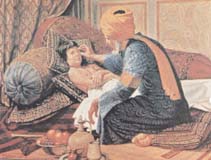 Pharmacy in the Islamic renaissance period became a separate science having all the essential elements of science i.e. : observation, research and experiment. Scientists of that era made methodical studies , carried out a great deal of medical experiments, used instruments and finally arrived at many discoveries.
Pharmacy in the Islamic renaissance period became a separate science having all the essential elements of science i.e. : observation, research and experiment. Scientists of that era made methodical studies , carried out a great deal of medical experiments, used instruments and finally arrived at many discoveries.
These are some of the most famous Muslim chemists :
Jabir Ibn Hayyan: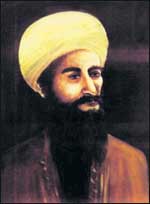
EXTRACTS FROM THE HISTORY OF ISLAMIC PHARMACY
Pharmacy in the Islamic renaissance period became a separate science having all the essential elements of science i.e. : observation, research and experiment. Scientists of that era made methodical studies , carried out a great deal of medical experiments, used instruments and finally arrived at many discoveries.
These are some of the most famous Muslim chemists :
Jabir Ibn Hayyan :
He is Abu Abdullah Jabir Ibn Hayyan Ibn Abdullah Al-Koufi known as As-Soufi . He was born in Tous – Khurasan, and lived in Al-Koufa where he worked as a chemist , while his father was a druggist . Referred to as At-Toussi or At-Tartoussi , he came down from Al-Azd tribe. His estimated date of birth is between 721-722 A.D. while the date of his death is unknown, but it is said that he died in 200 H ( 815 A.D.). Holmyard says that Jabir lived about 95 years, his proof of this, is that his works were not to be compiled in a shorter time.
Jabir Ibn Hayyan is considered one of the most talented Muslim figures, and the first pioneer in Alchemy, a fact supported by Abu Bakr Ar-Razi when referring to Jabir in his books as "Our Master". Alchemy at that time made great strides through his efforts as he was the first to prepare Sulphuric acid, Nitric acid, Sodium carbonate , Potassium carbonate and gold water. He was also the first alchemist to use precision scales in chemical experiments, and the first to devise crystallization, filtration, distillation , sublimation and others.
He was quoted to say : "He who deals with alchemy should work hard and conduct experiments, as knowledge is unattainable without it". Thus Jabir Ibn Hayyan , and later Maslamah Ibn Ahmed Al-Mijreeti preceded Western scientists by centuries in yielding science to experiment and laying down the basis of scientific approach which is based on experiment.
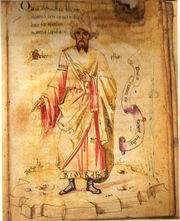
Some of his works in alchemy and pharmacy are : "Almawazeen" (Scales), , "Sirrulassrar" ( The Secret of Secrets ) , " Alkhawass" (The Qualities) and "As-Somoom Wa Dafu' Adhrariha" (Poisons And How to Avoid Their Harm). Most of these books were translated into the European Languages, and treated as a reference in European Universities for centuries.
Abu Bakr Ar-Razi: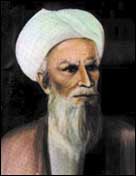
Abu Bakr Ar-Razi was born in Ar-Reyy in the year 250 H and died in 311 H . Since early childhood he was known to love learning, so he turned at an early age to learn Music, Mathematics and Philosophy. When he was thirty he started to study Medicine and Alchemy and was able to achieve great success. All of his time was devoted to reading, research and copying from books. It was totally divided between reading, research and conducting experiments or in writing and classification .
This scholar excelled in Medicine, Pharmacy and Alchemy, and such medical, pharmaceutical and chemical sciences were greatly advanced through his efforts so that he was called "Abuttibb Alarabi" (Father of Arab Medicine) .
Ar-Razi is considered one of the first pioneers in Medicine, not only among Muslim scholars, but also throughout the whole international and human heritage. The following are some aspects of his pioneering role , mastery and uniqueness in many fields:
Devised sutures made from animal skin known as "Al-Qissab".First to make mercury ointment.Presented a detailed explanation of pediatric, gynecological and obstetrical diseases, venereal diseases and ophthalmic surgery and diseases. Was one of the experimental research pioneers in medical sciences . He conducted some experiments by himself on animals like monkeys, by giving them medicine and observing its effect on them. If the result was positive then he would apply it on human beings.Paid great attention to case history of the patient and recorded the development of his disease in order to monitor his case and prescribe the right medicine. Adopted treatment based on herbs and food, and avoided synthesized medicine except for necessity . In this regard he said: "Whenever you could use herbal medicine, you should avoid the synthesized one ".Made use of the indications of blood analysis, urine analysis and pulse to diagnose diseases.Used different methods in treating different diseases.Was greatly interested in the psychological aspects of the patient, raising his morale and relieving his fears through the traditional psychological techniques until he is fully recovered. Here he says: " A physician should make his patient think that he is quite healthy, and give him hope for better health even if he is not quite sure of what he tells his patient, because the disposition of the body is greatly associated with the ethics of the soul Was well-known in clinical medicine and well-versed in this field. He clearly differentiated between smallpox and measles, and was the first to precisely describe these two diseases distinguishing between them by the proper signs of each.
At that time he was widely known, that he was called "Gallinus of Arabia", and some said about him: "Medicine was scattered then it was brought together by Al-Razi"
He wrote many books. The most important of these was "Al-Manssouri fittashreeh" (Al-Manssouri in Anatomy) which was dedicated to Al-Manssour, the Prince of Khurassan and was later translated into Latin by Jerar Alkremoni, with the Alchemy chapters taught in the European Universities until the 16th century.
As for his book "Al-Hawi fittadawi" (the Comprehensive in The Science of Medicine), it was a vast encyclopedia of 20 volumes in all branches of medicine and Alchemy. It was also taught in the European universities and was one of the 9 medical books taught at Paris School of Medicine.
Lastly, his book "Aljadari walhasba" (Smallpox and Measles) was considered the first scientific study to show the difference between the diagnosis of these two maladies. Due to the scientific value of this book, it was reprinted forty times in the English Language between 1494 and 1866 . It was one of the first books produced by the early printing presses in the whole world.
Avicenna (Ibn Seena):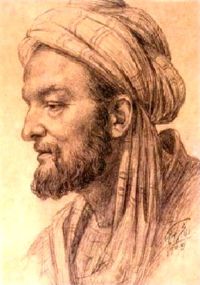
Abu Ali Al-Hussein Ibn Seena is one of the most eminent Muslim scholars in medicine and treatment. He was born in "Kharmeesh" a village of "Bukhara" . He was twenty when his father died, and he left his village to live in "Jarjan". Here he wrote his book "Al-Qanoon fittib" (Canon of Medicine), but soon he moved to "Hamathan" where he gained great reputation and became the vizier of the Emir Shamsuddin Al-Buwaihi. But again he did not stay long there and left for "Asfahan" where he found favour with its prince and stayed there until he died in 428 H (1037 A.D. ).
His book (Canon of Medicine) is considered one of the most famous medical works the world has ever known. This encyclopedia remained the medical reference for physicians and chemists in many civilized countries until early 18th century. The translation of his books began in early 12th century. Some of his studies were the basis for educational programmes of physicians and chemists in Spain, France, Italy until mid 18th century.
Ibn Seena had a good knowledge of drugs and their effects on patients. He divided them into six groups. The herbal and the synthesized (pharmacopoeia) drugs which he mentioned in his works especially (Al-Qanoon), had a great effect and a big scientific value among physicians and chemists at that time. In his book he prescribed about 760 drugs and assorted them alphabetically.
It is truly amazing that he practiced what is known as Experimental Medicine and applied it to his patients. Thus he used to try any new medicine on animals first, then on human beings if it proved to be appropriate and effective .
He also spoke about environmental pollution and its bad effects on the human body. In this regard he said: " As long as air is pure, healthy and free of impurities as it does not interfere with respiration, then one will enjoy good health" . He mentioned the effects of pollutants in causing allergic diseases of the respiratory system.



